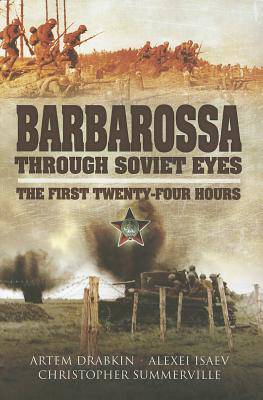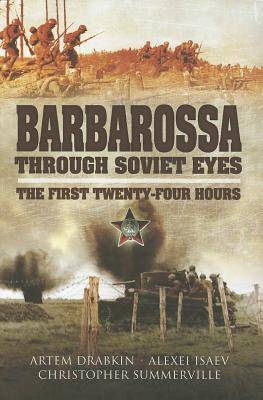
- Afhalen na 1 uur in een winkel met voorraad
- Gratis thuislevering in België vanaf € 30
- Ruim aanbod met 7 miljoen producten
- Afhalen na 1 uur in een winkel met voorraad
- Gratis thuislevering in België vanaf € 30
- Ruim aanbod met 7 miljoen producten
Zoeken
Barbarossa Through Soviet Eyes
The First Twenty-Four Hours
Artem Drabkin, Christopher Summerville, Alexei Isaev
Hardcover | Engels
€ 50,45
+ 100 punten
Omschrijving
22 June 1941 changed the direction of the Second World War. It also changed the direction of human history. Unleashing a massive, three-pronged assault into Soviet territory, the German army unwittingly created its own nemesis, forging the modern Russian state in the process. Thus, for most Russians, 22 June 1941 was a critical point in their nation's history. After the first day of 'Barbarossa' nothing would be the same again - for anyone. Now, for the first time in English, Russians speak of their experiences on that fatal Sunday. Apparently caught off guard by Hitler's initiative, the Soviets struggled to make sense of a disaster that had seemingly struck from nowhere. Here are generals scrambling to mobilize ill-prepared divisions, pilots defying orders not to grapple with the mighty Luftwaffe, bewildered soldiers showing individual acts of blind courage, and civilians dumbstruck by air raid sirens and radio broadcasts telling of German treachery.
Specificaties
Betrokkenen
- Auteur(s):
- Uitgeverij:
Inhoud
- Aantal bladzijden:
- 186
- Taal:
- Engels
Eigenschappen
- Productcode (EAN):
- 9781844159239
- Verschijningsdatum:
- 19/07/2012
- Uitvoering:
- Hardcover
- Formaat:
- Ongenaaid / garenloos gebonden
- Afmetingen:
- 157 mm x 234 mm
- Gewicht:
- 589 g

Alleen bij Standaard Boekhandel
+ 100 punten op je klantenkaart van Standaard Boekhandel
Beoordelingen
We publiceren alleen reviews die voldoen aan de voorwaarden voor reviews. Bekijk onze voorwaarden voor reviews.











